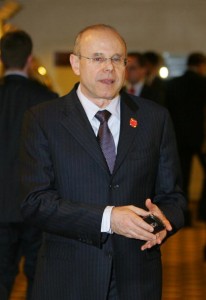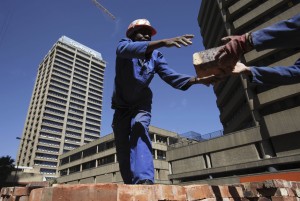

Follow us on:  
|

High stakes budget speeches in India and South Africa are the big items on this week’s economic calendar. India’s Palaniappan Chidambaram and South Africa’s Pravin Gordhan will seek to reassure investors that their respective governments can effectively manage finances amid difficult economic condition. Elsewhere in the BRICS, Brazil will provide updates on consumer confidence and growth. Russia will update on inflation and China will provide a manufacturing snapshot. Here is your guide.
Brazil
Three inflation gauges from the Fundação Instituto de Pesquisas Econômicas (Fipe) and the Fundação Getulio Vargas (FGV) will kick-off Brazil’s data week on Monday. Markets expect Fipe’s weekly consumer price index (CPI) and FGV’s construction costs index to rise, but FGV’s monthly CPI to show a slight deceleration.
On Tuesday, FGV’s consumer confidence index is expected to slide from 117.9 to 116.0. The country’s unemployment rate is predicted to rise from 4.6% to 5.2% and lending data is forecast to show that Brazil’s personal loan default rate remained unchanged at 7.9% in January.

Brazil’s finance minister expects growth to pick up to between 3 per cent and 4 per cent in 2013 [Getty Images]
On Friday, IBGE will release fourth quarter and 2012 full year gross domestic product (GDP) figures and the country’s Trade Ministry will release February’s trade figures.
Brazil’s central bank estimates that Brazil’s economy – South America’s largest – expanded by 1.0% in 2012 from a year earlier. Finance minister Guido Mantega expects growth to pick up to between 3.0% and 4.0% in 2013.
Brazil’s trade deficit swelled to a record $4 billion in January, largely as a result of the delayed inclusion of oil imports made at the end of last year into January’s figures. Numbers released by the country’s central bank last week showed that imports totalled $7.25 billion and exports totalled $6.59 billion during the first two weeks of February.
For the month as a whole, analysts expect exports fell to $14.9 billion from $16 billion in January and that imports fell from $20 billion to $16 billion, narrowing the trade gap to $1 billion.
Russia
It will be a light week for economic data in Russia this week. The country’s central bank will release weekly inflation readings on Wednesday. Weekly foreign exchange and gold reserves will follow on Thursday.
Russia’s economy ministry said last week that it expects consumer prices to rise between 0.5% and 0.6% in February, down from 1.0% in January. In annual terms, the ministry expects inflation to reach 7.2% to 7.3% during February, up from 7.1% in the first month of the year.
The deputy chairman of Russia’s central bank, Alexei Ulyukayev, said earlier this month that inflation was close to peak levels and will probably slow to within the bank’s target range of 5.0% to 6.0% during the second quarter of 2013. This would be welcome news to policymakers.
Russia’s central bank has faced widespread criticism from the country’s business community and government – including from President Vladimir Putin directly – for not loosening monetary policy to spur growth. But central bankers have repeatedly insisted that price pressures must abate before rates can be cut.
In testimony to the upper house of Russia’s parliament last Wednesday, Bank Rossii’s chairman Sergai Ignatyev said, “We expect inflation to fall in the next few months, and if that happens we may start to cut interest rates. But there’s no promise.”
“The key task of monetary policy,” he reiterated, “is to maintain a low and stable inflation rate.”
Bank Rossii left rates on hold at 8.25% at its most recent meeting and is widely expected to do so again at its next meeting in March. Russia’s economy slowed to 3.4% growth in 2012 from 4.3% in 2011. The International Monetary Fund (IMF) expects the country’s economy to expand by around 3.75% this year.
India
Palaniappan Chidambaram, India’s finance minister, will present India’s railway budget and annual economic survey on Wednesday. The economic survey presents the government’s views on India’s economy, including its performance over the previous 12 months and performance prospects for the short-to medium-term.
Markets will be watching the minister’s remarks as a first indication of the direction of the country’s annual budget, which will be presented to parliament on Thursday. Much is at stake.

Palaniappan Chidambaram, India’s finance minister, will present India’s railway budget on Wednesday [Getty Images]
Against that backdrop, analysts will be paying particularly close attention to government’s plans to contain the country’s fiscal deficit at a targeted 4.8% of GDP in the 2013/14 financial year, down from a 5.3% target in the current financial year. More specifically, investors will look to the budget’s gross market borrowing target. Any figure below six trillion rupees would be viewed as an indication of fiscal discipline.
The challenge for Mr Chidambaram will be to present an austere budget – aimed at reassuring investors markets and encouraging badly needed private investment – that simultaneously helps to boost India’s struggling economy. Advanced estimates of GDP growth from India’s Central Statistics Office peg growth in the 2012/13 financial year at 5.0%, the slowest since the 2003/04 fiscal year.
“The slowdown in growth in 2012-13 is on account of lower growth in agriculture, industry and the services sector,” minister of state for finance Namo Narain Meena said last week in response to parliamentary questions. Final growth figures will be released on Thursday.
China
The only major data release on China’s economic calendar this week is Friday’s official manufacturing purchasing managers’ index (PMI) readings from the China Federation of Logistics and Purchasing (CFLP) and National Bureau of Statistics.
China’s official PMI slipped into negative territory in August and September, when economic growth fell to a three-year low, but has remained above the 50.0 mark separating expansion from contraction since October. This closely-followed forward-looking measure of economic activity is expected to rise from 50.4 in February to 50.9 in March, indicating a slight uptick in the pace of China’s economic recovery.
China’s economy expanded by 7.8% in 2012 – the slowest pace of growth since 1999 – but picked up to 7.9% growth in the final three months of the year. The Chinese Academy of Social Sciences expects 8.4% growth in 2013.
In the run-up to Friday’s release, markets will keep an eye on the Communist Party of China’s (CPC) Central Committee meeting. According to a report from the Xinhua News Agency, the Second Plenum of the 18th Central Committee will meet from Tuesday to Thursday to finalise China’s new cabinet and consider a host of administrative reforms, a once in five years event.
According to a report in Caijing magazine on Saturday, the Plenum will reform the country’s food safety system, merge the country’s ministry of railways into the ministry of transport and widen the ministry of civil affairs’s portfolio, among other changes.
Changes recommended by the Plenum will be approved by China’s legislature – the National People’s Congress – in March when it gathers for its annual session. The March session will also mark the official, once in a decade transfer of power from current President Hu Jintao to incoming leader Xi Jinping and Li Keqiang’s succession of Wen Jiabao as Premier.
South Africa
Finance minister Pravin Gordhan’s 2013 budget speech is the big item on South Africa’s calendar this week. Corporates, consumers and investors will all be watching for funding details of the government’s ambitious National Development Plan, National Health Insurance initiative and plans for youth employment initiatives.
“The minister must provide both domestic and foreign investors with the reassurance of a responsible budget that supports economic stability,” Neren Rau, chief executive of the South African Chamber of Commerce and Industry (SACCI), said in a statement last week.

Stats SA will release fourth quarter GDP figures on Tuesday [AP]
Beyond Wednesday’s budget speech, markets will be on the lookout for a number of data releases in South Africa this week. Statistics South Africa (Stats SA) will release November’s tourism numbers and January’s liquidations figures on Monday and fourth quarter GDP figures on Tuesday.
On a quarterly basis, South Africa’s economy likely grew 1.3% in the final three months of 2012, up slightly from the previous quarter’s 1.2% expansion. During his State of the Nation address earlier this month, President Jacob Zuma said that South Africa’s government expects 2.5% year on year growth this year.
On Thursday, the South African Revenue Service will release January’s preliminary trade figures and the South African Reserve Bank will release January’s money supply and private sector credit extension data. Markets expect M3 money supply to have expanded by 5.8%, up from 5.2% in December. Private sector credit extension is likely to have risen to 10.4% year on year growth in January from 10.0% growth in December.
Finally, on Friday, economists and investors will watch for PMI data from the Bureau of Economic Research. South Africa’s manufacturing PMI remained in contraction territory in February.